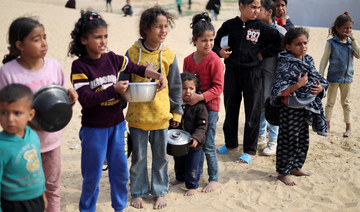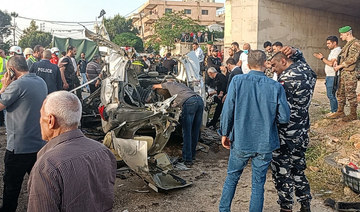BAGHDAD: Diplomatic activity between Ankara and Baghdad has surged this week, with senior Turkish officials making a high-level visit to the Iraqi capital on Thursday to discuss security, energy, and defense issues with their Iraqi counterparts.
The meetings, attended by key figures in Turkish foreign policy, defense, and intelligence agencies, centered not only on the reopening of oil transportation through the Turkish-Iraqi pipeline, but also on collaborative efforts to combat terrorism, particularly targeting the outlawed Kurdistan Workers’ Party or PKK.
“During the meetings, the importance of Iraq’s political unity, sovereignty, and territorial integrity have been emphasized by both sides.
The parties have also underscored that the PKK poses a security threat to both Turkiye and Iraq, and its presence in Iraqi territory constitutes a violation of the Iraqi Constitution,” noted the joint official statement issued following Thursday’s meetings.
Baghdad has adopted a novel foreign policy approach with Iran, ultimately aiming to curtail foreign interference in Iraq.
Dr. Bilgay Duman Analyst
In the statement, Turkiye has also welcomed the decision by the Iraqi National Security Council declaring the PKK an outlawed organization in Iraq, and said “the parties have discussed measures to be taken against organizations and affiliates targeting Turkiye from Iraqi territories.”
Nuh Yilmaz, chief adviser of Turkish Ministry of Foreign Affairs, posted on social media site X on Thursday night: “In the meetings held in Baghdad, Iraq and Turkiye decided to go beyond common threats and fight PKK terrorism together for the first time. A landmark decision. We’ll see the results gradually.”
Since early March, both Turkish President Recep Tayyip Erdogan and Defense Minister Yasar Guler have hinted at the possibility of a summer cross-border military operation to bolster security along the Turkish-Iraqi border and fortify Turkish military points in the region.
Erdogan, who last visited Baghdad in 2012, is expected to make a trip to Iraq before the end of April.
Similarly, Turkish Ministry of Foreign Affairs spokesperson Oncu Keceli said on Wednesday: “The Iraqi authorities recognizing the PKK as a common security threat signals a growing willingness to combat the PKK within Iraq.”
Historically, Turkiye and Iraq have often clashed over the former’s intensified cross-border operations against PKK militants based in northern Iraq’s mountainous regions.
Iraq has protested, citing violations of its sovereignty, while Turkiye defended the operations as essential to safeguard its territorial integrity.
The talks on Thursday followed previous visits by Turkish intelligence chief Ibrahim Kalin and Defense Minister Guler in January.
Additionally, last week, Kalin and Turkish Foreign Minister Hakan Fidan held high-level meetings in Washington with US officials, considering the presence of US troops in Iraq.
Experts speculate that such a military operation could serve the interests of the ruling Justice and Development Party, particularly ahead of local elections on March 31, as it may attract nationalist support.
Since December, at least 25 Turkish soldiers have been killed in attacks by PKK militants, prompting Turkiye to respond with airstrikes.
“This year, the Claw-Lock operation will be completed initially, and operations will be expanded to other necessary areas,” Guler said recently.
Dr. Bilgay Duman, coordinator of Iraq studies at the Ankara-based think tank ORSAM, said that Iraq is facing its most severe threat perception regarding the presence of the PKK within its borders.
“Due to the series of operations initiated by Ankara since 2019, the PKK has been compelled to shift from the northern mountainous regions to the southern areas of Iraq, resulting in the evacuation of about 800 villages in the north,” he said.
“This geographical relocation has forced the PKK to extend its reach to urban centers in Iraq, such as Sulaimaniyah, Kirkuk, and Sinjar, leading to engagements with officials from the central administration.”
Duman said that the Iraqi central administration was striving to establish a new regional equilibrium to quell the instability that has persisted for two decades.
“Baghdad has adopted a novel foreign policy approach with Iran, ultimately aiming to curtail foreign interference in Iraq,” he said.
Simultaneously, the Turkiye-Iraq Development Road Project has heralded a fresh chapter in bilateral relations between Ankara and Baghdad. Duman underscored the significance of this ambitious infrastructure venture, which aims to link Iraq and Turkiye through railways, ports, roads, and cities, fostering a new economic development paradigm in the region necessitating robust security measures.
“Security must be reinstated along the regions traversed by this project, prompting Baghdad to take proactive measures to reinforce its central administrative authority,” he said.
The project, slated for completion in three phases by 2028, 2033, and 2050, is anticipated to integrate Iraq into the global arena via Turkiye.
Regarding the imminent summer operation targeting PKK hideouts in Iraqi territories, Duman said that it would be a continuation of previous Turkish endeavors to eradicate PKK presence in the northern regions.
“Turkiye aims to establish a 30-40 km-deep security corridor along its borders, supplementing it with military installations in coordination with the Iraqi government,” he said.
“Given the impracticality of deploying soldiers along every point of the 378 km border with Iraq, Turkiye is likely to conduct sporadic operations, potentially in collaboration with Iraq, owing to shared threat perceptions.”
Duman said a joint operation room could even be established to ensure seamless military coordination.
Rich Outzen, senior fellow at the Atlantic Council and the Jamestown Foundation, believes the possibility of a large operation from mid-spring through summer is very high.
“President Erdogan and others in Ankara have signaled a significant operation to disrupt PKK transport and supply routes — also referred to as ‘lines of communication’ in military parlance — that travel east-west from Qandil, through the Irbil area and out to Sinjar. Disrupting those lines requires moving off the mountain ridgelines along the border deeper into Iraq. That would be the immediate goal,” he told
Arab News.
According to Outzen, Irbil’s motives are clear: to re-establish security control in areas of the Kurdistan region of Iraq that the PKK has gradually asserted control over in recent years.
“For Baghdad, the motive might be to avoid confrontation with Ankara during the operations by participating and helping to shape or limit them,” he said.
“In the background, Baghdad is involved in a struggle for autonomy over foreign policy from Tehran, which exercises influence in numerous ways,” he said.
Outzen added: “Deepening cooperation with Turkiye is one way to develop a counterweight to Iranian influence, which has risen as US influence in Iraq has waned. Especially with talk of a possible withdrawal or further reduction in US troop levels in Iraq, Turkiye becomes a more attractive security partner.”
In the meantime, the burgeoning cooperation between Ankara and Baghdad in counterterrorism may exert pressure on the Iraqi Kurdish Patriotic Union of Kurdistan or PUK, which governs Sulaimaniyah province.
“Accused of backing the PKK, the PUK faces heightened scrutiny, compounded by Turkiye’s closure of its airspace at the Sulaimaniyah airport since April, exerting additional social strain on residents,” Duman said.
“The prospect of joint military operations between Turkiye and Iraq may further marginalize the PUK, potentially compelling the party to reassess its stance toward the PKK.”
From his part, Outzen noted that PUK and PKK are both known
for their close ties to Iranian security services.
“And Baghdad may have come to the conclusion that it’s time to pare back their ambitions in the north as well,” he said.





























